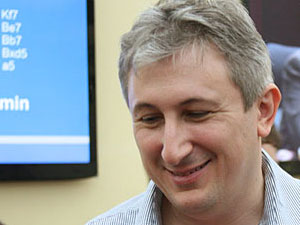


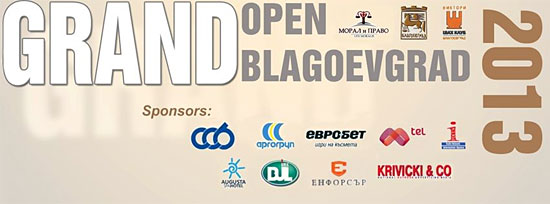
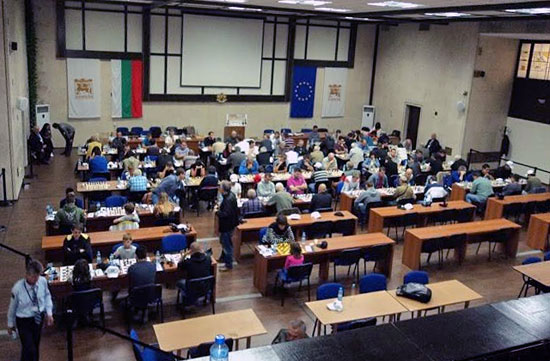
We conducted the following "interview" (consisting of just one question) with our old friend Maxim Dlugy via Skype earlier today morning. In spite of having to prepare for the next round of the event, Max spent half an hour telling us what had transpired in the first seven rounds of the tournament. Here our transcription of the recorded interview:
Maxim, tell us what happened to you in the Blagoevgrad Open.
Well, here’s the story: for family reasons I am in Europe for longer than usual, and after a while I decided to play some chess. I noticed this tournament in Blagoevgrad, and I thought why not go there. So I arrived in Sophia, and at this point Kiril Georgiev said to me: “You are going to Blagoevgrad?” I said, “Yeah – are you playing?” and he said “No, no, I’m not playing, because of this guy Borislav Ivanov, the famous cheater.” And I said: “Yes, I remember, I read it on ChessBase a month ago. Is this an ongoing situation or something?” We decided to meet for dinner, and as we discussed the situation I am feeling a little annoyed, actually – because this is the first tournament this guy is playing in, after a four-month ban, after forty Bulgarian players signed a boycott, saying they would not play in a tournament with him. I said so why would any sponsors do this, why would they take this guy instead of forty guys? A big tournament in Bulgaria, five thousand as first prize… Kiril was of the opinion that the organisers will do anything to basically prove that the guy is for real.
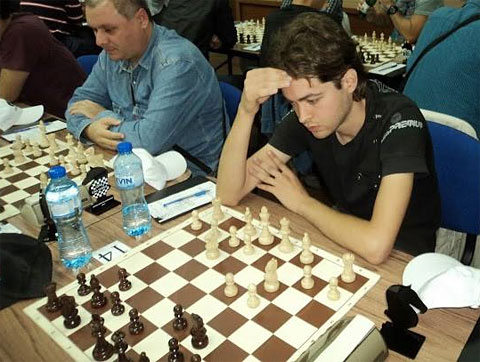
Borislav Ivanov in this round one game against Momchil Momchev
As the story progresses, as the whole thing unveils, I see the guy playing extremely aggressive, very strong, very tactical moves against experts, in the first two rounds. Everything is hanging, pieces are hanging, and he is boom-boom-boom, first to finish both games. [All Ivanov games are given in a JavaScript player below]. I’m like “Wait a second, WAIT A SECOND…” Meanwhile there is a lot of security, there are jamming and scrambling units placed on both sides of the hall, cell-phones are taken out, electronics are checked for, there are metal detector searches, for every player before every round.
Then comes round three, where he plays white against Ivan Saric, a 2630 player, a real professional, who should normally beat a 2200/2300 guy. The game is a very tactical line of the g4 Anti-Meran. I am sitting next to him and I am watching him, and I see that his gaze is not really focussed on the board – it’s sort of off, a little bit. Not only that, he is doing a nervous thing with his feet. The game proceeds, and is amazingly strongly played by White – an extremely complicated position that basically looks better for Black, because White sacrifices a piece and goes on to play amazing chess to take off all of Saric’s pawns. In between Saric had to play some good move in order not to lose. The game ends in a draw, and I wait for Saric to come out and I said: “Didn’t you feel like you played a machine today?” He says “Yeah, but what can I do, I tried, I offered a draw on move thirteen, and he just waved it off…” I said “WHAT?? This is just unbelievable. A person three hundred rating points higher offers you a draw and you are like ‘are you kidding me, I’m going to beat the hell out of you, because I have a Houdini behind me!’”
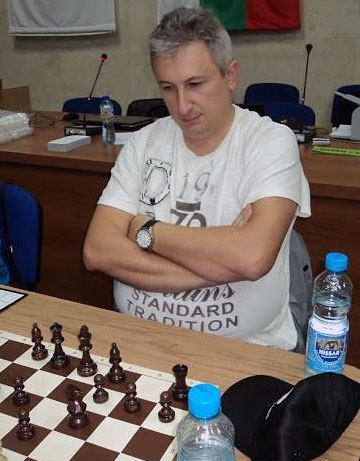
GM Maxim Dlugy, playing in the Blagoevgrad Open 2013
At this point things became pretty serious. I said something has to be done, this is just nuts, to continue with this, to live with this. Everybody is worried: I’m going to play him, what am I going to do… So before the next round the director says actually now the sponsor says they are going to search him. Petkov is going to play him in round four, and before the round starts I tell him “Look for his shoes, I’m sure it’s in his shoes, because I noticed that he is doing something peculiar with his feet. He is wearing pretty big sneakers, like the ones they would force you to take off at airports, to make sure that you are not carrying something interesting. They come back and I ask Petkov: did he have anything, and he says no, everything was fine. And Petkov proceeds to beat him. But an interesting situation: the final position against Petkov is actually dead drawn, but he just resigned. It seems to me that he planned to lose that game, to lose to Petkov and to win the rest – to subject himself to the search, and then keep winning, like “I’ve been searched once, now what you guys want from me?” Petkov was his alibi.
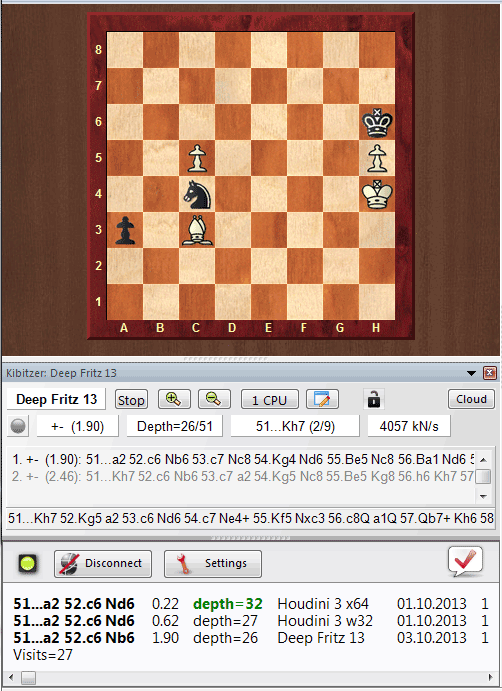
If you look at the final position, if Black plays 51…a2 it is just a draw. The computer maybe shows plus two pawns, but it is actually a dead drawn position. Yet he resigned.
After that Ivanov beat some expert. He was Black, it was one of these things where White sacrifices a pawn on c4 in a Catalan, and he just kept it forever and destroyed the guy basically. So the next round he is due to play me. Well, I’ve been in business for a while, where there are good situations and bad situations, and I am used to handling bad situations as well. I said this is not going to happen to me, I’m not going to roll over and die, this is ridiculous. So I called a friend from Sofia, where we have an office, and tell him look, I’m going to say you’re my security guy, because I don’t really want to do the search myself. I should be playing chess, not searching people. I also spoke to a lot of technical people, around the world, about how he could be doing this. We all figured out it is all in his shoes. I actually think he has the computer in his shoes – he doesn’t need any outside connection. He is using his toes to receive and give signals, in Morse code or whatever he has decided to use. His toes are actually tied in, electronically, so he cannot actually take off his shoes. It’s not only that he can’t show them, he can’t take them off. When he walks he walks in a very funny gait, like he is afraid to step on a part of his shoe. It was noted by a lot of players in previous tournaments, that he has this strange walk. I have a good friend, who is an actress in a theatre in Sofia, and she knows how people walk and noticed that he has a very strange gait, a walk that is not natural.
When I came with my friend to the tournament hall I said this is my head of security, he is going to perform the search. The tournament director [Stefan Fotev] was a bit upset about this, he said my friend doesn’t have jurisdiction, he cannot do the search, just watch, and only if the sponsor agreed. This was completely unforeseen – he thought he lost to Petkov, he got searched once, and that was enough. Now he was free and clear to win the tournament. So now the first thing Borislav does is to go to the director’s table and leave his jacket there. That is very strange. I mean my jacket was hanging on my chair. Well, he goes back to the table and writes on his scoresheet “White: machine, Black: unknown clown”. He writes on his scoresheet: White машина (in Bulgarian) and не знам на клоун, which is “unknown clown”. The tournament director looked at the scoresheet and actually showed it to me. I did not even understand what it was referring to, until something Arthur Kogan published something on Facebook regarding this. I thought the director wrote this. I got confused, but it was what Borislav wrote, on his public scoresheet. I guess he was just very upset that he was going to be searched. He was definitely not prepared for this. He got up and he was panicking, his eyes were moving, he was gesticulating – it was the first time that I had seen him actually move, in the last five days. He was clearly worried.
So we all go into this room: the director, the head of security, my friend, myself and Borislav. They have metal detectors and go over every place very carefully if it beeps, and show that there is nothing there. The security guy says at the start “Look, I’m going to search him, you’re going to watch. If you want something else you tell us, but whatever it is we will do the exact same thing on Borislav’s opponent. I said yes, of course, no problem. This was a very funny moment. The search is completed and my friend goes “Okay, and now take off your shoes.” The security guy looks at me. Without a word I take off my shoes, I take off my socks and throw them to the floor – just ba-doom, there, I’m done, now show me your shoes, please.
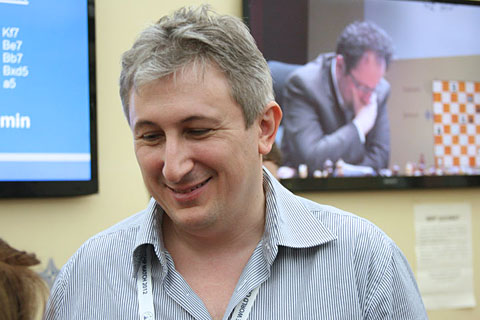
Maxim was a special guest at the World Championship match Anand vs Gelfand
What happened next was completely unexpected. The guy just goes “I categorically will not take off my shoes. My socks smell.” At this point my friend says: “I guess that would be forfeit, right?” and Borislav says: “if you have to forfeit me, forfeit me. But I will not take off my shoes.” The arbiter said: “You realise that you will lose, but I will also have to disqualify you from continuing to play in the tournament, and no one will play you ever again. All you have to do is to take off your shoes.” He actually tried to convince him for another couple of minutes, but Borislav was categorical about it: “Now way I’m taking off my shoes. No way!” So the director shrugs and says “Okay, I’m putting in a zero.”
And then something very interesting happened. After this whole thing Ivanov was supposed to be withdrawn from the tournament, and yet he’s paired for the next round. I’m pretty convinced that the organisers want to prove that the guy is no fluke, and what is going to happen in this round, where he is playing some expert, he will be subject to a search, they will show that he has nothing on him. At that point, once he wins this game, which he could, possibly – he is I guess a 2200 player – and they would say look, the guy is clean. But this is only for a really dumb audience. This kind of thing will not work on a thinking type. It was clear that there was something in the jacket. They did not check the jacket, because we did not get to it. He gave up before.
I watched him very carefully. When he played this move, 32.Nb7 against Saric, he took ten seconds. It was a five to ten minute thing, in my modest opinion, since the knight could take on f5 instead. But when he decided it in ten seconds I was shocked. He doesn’t know when to put on the theatrics. You have to be strong enough to do that. If I had this gadget I would be killing people left and right, and nobody would know. This is the real danger, because if a 2600 player has this thing, he knows exactly how to behave, he knows exactly when to think, and he doesn’t to use it more than four times during a game. That’s plenty to destroy anyone. At the critical junction you switch it on and find out which way do I go: oh, this little nuance I didn’t see, okay, fine, boom, goodbye! That’s it. At that point you may think for a long time, although you know the move. But this guy doesn’t know, he’s just mechanically playing the first move of the computer. Everyone is a clown to him. He says Kiril Georgiev, put me in a bunker with him and I will destroy him. The guy has no moral compunctions, he is absolutely immoral.
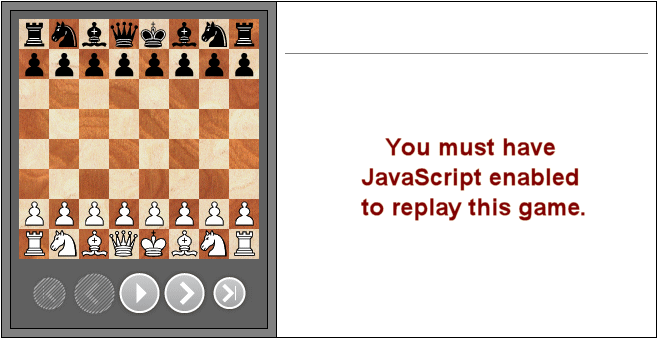
Select games from the dropdown menu above the board
Official Tournament site – All games so far in zipped PGN
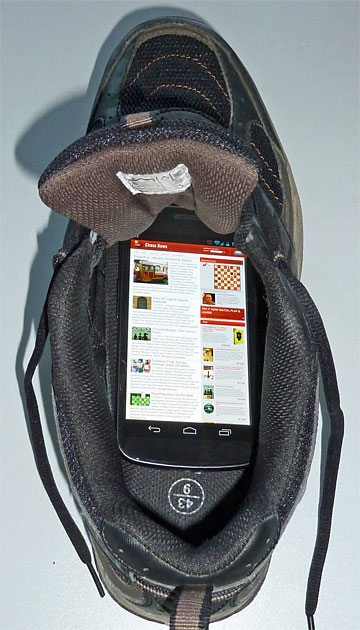
We have done a little research and found that, unfortunately, there is a very low-tech way to cheat in chess: a modern Android or Apple smartphone easily fits into a shoe, and you can use your toes to send signals to the motion detector in the phone. Little wiggles will do it. Or the toe can be used to tap on the LED screen. The response of the phone would be short bursts of vibration. An app could handle the interface to a chess engine running on the device. So it is not really necessary to work out a very complicated communication system to explain how a player may be using computer assistance during a chess tournament.
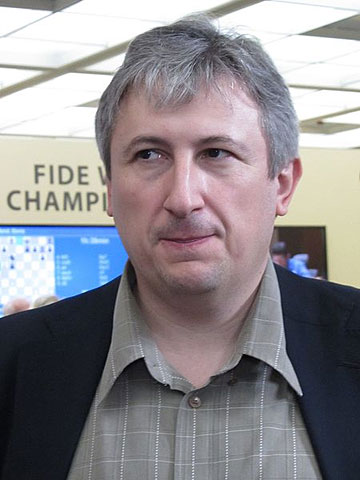
Born on Moscow, 1966, Maxim Dlugy was the only child of Nina Ritov, a young doctor, and Alexander Dlugy, a Textile Engineer. In 1974 the family applied to emigrate, after which Nina and Alexander lost their professional jobs and had to work doing manual labor to make ends meet. In the winter of 1976, the family finally received permission to emigrate and by March, of 1977, New York was their new home.
It was in Moscow at six years of age that Maxim first developed his interest in chess from his grandfather Max Ritov, an International Master who played on one team with David Bronstein. Maxim was completely taken by chess and spent a lot of time playing adults. At nine years he organized a chess club at his school for kids his age and older. By the time the family moved to Queens in New York Maxim was devouring chess books and taking on all the Russian immigrants in a nearby park. In the summer of 1977 hew was taken to the famous Manhattan Chess Club, where young Maxim dazzled club members. In his first event he scored three out of four against the clubs top juniors. Jack Collins, who gained near legendary status by being an early teacher of Bobby Fischer, became Maxim’s first formal trainer. After that he worked with USCF Senior Master Jeffrey Kastner for a brief period, then with Vitaly Zaltsman, under whose training he became known as one of the world's most talented young players. The rest is, as they say, history.
In 1990 Maxim turned to chess politics and ran for and was elected President of the United States Chess Federation. When Bankers Trust placed an ad in the New York Times for young chess masters believing that they would make good securities traders, Dlugy answered and got a job working on Wall Street. Eventually, he became a principal of the Russian Growth Fund, a hedge fund. Former world chess champion Garry Kasparov was formerly associated with Dlugy's Russian Growth Fund.
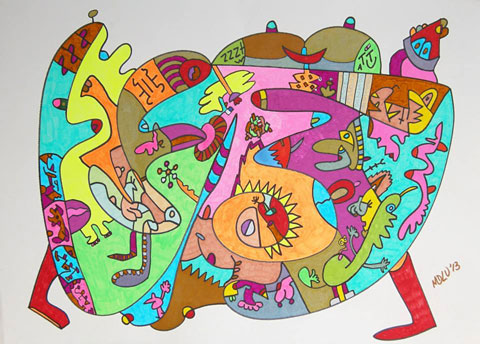
Seven paintings by Maxim Dlugy were exhibited at the Tretjakov Gallery during the final days of the 2012 World Chess Championship. Max plans to design various beautiful accessories, clothes, etc., using his art. Visit the Maximatism Facebook page , where you can see the gradual process of art creation parallel between a chess game and a finished painting is drawn.
08.1.2013 - Cheating
scandal in Croatia – feedback and analysis
Recently we reported that the incredibly brilliant play by a 25-year-old
untitled Bulgarian player at the Zadar Open in Croatia had raised suspicion
that he might have been using illicit electronic assistance during his games.
A number of readers criticised us – for linking to the mainstream
Croatian media reports?! One of them, an expert in the field, actually analysed
all the games in question.
17.1.2013 - Cheating
scandal – Borislav Ivanov speaks out
Recently a 25-year-old untitled Bulgarian player scored 6.0/9 points in
a strong GM tournament, with a 2697 performance. His opponents complained,
he was searched, and no electronic equipment was found. Still, the case
put chess on the front pages of the mainstream media, and led to intense
discussions on the Internet. Now Ivanov has given the Russian news portal
WhyChess an exclusive interview.
23.3.2013 - A
Game of Chicken: Ivanov rides again
In the last weeks of 2012 he wowed the chess world with a 2700 performance.
Two months later the new Bulgarian star FM Borislav Ivanov finished 88th
in the Plovdiv, this time with a performance of 1970. Then came another
enviable achievement, a clear win at the Villava rapid (again with a 2700
performance). What is going on? Alex Karaivanov speculates, with new video
analysis by Valeri Lilov.
3.6.2013 - The
show goes on: Ivanov in Kustendil
Borislav Ivanov is an FM who in the past months has been crushing GM hundreds
of points stronger than himself. Bulgarian GMs, who suspect computer cheating,
are now boycotting tournaments in which he appears, or chosing not to play
their games against him. Ivanov has called them antisocial buttheads in
newspaper interviews. Alex Karaivanov reports, with new video analysis by
Valeri Lilov.
5.6.2013 - Experts
weigh in on Ivanov's performance
Two days ago we reported on the crushing victories of a Bulgarian FM against
top grandmasters and the suspicion that he was secretly using computer assistance
to achieve his success. Extensive analysis of the games by Valeri Lilov
made this seem quite plausible. In part two of our series we present the
opinions of international experts and one of the GM victims, plus initial
reader feeback.
19.6.2013 - Rombaldoni:
"He never calculated moves"
The very talented Italian IM Axel Rombaldoni, aiming for a final GM norm,
recently travelled to Bulgaria to play in a GM tournament. First he discovered
that most of the grandmasters had cancelled their participation, and then
in round seven he faced the reason for the cancellation: FM Borislav Ivanov,
who has been accused of computer cheating. Alex tells us what it is like
to play Ivanov.
11.7.2013 - Ivanov
misses BCF anti-cheating test
The Borislav Ivanov saga continues. Recently the wonder chess player agreed
to take part in a test, conducted by the Bulgarian Chess Federation, to
prove the authenticity of his amazing new-found chess skills. In the end
Ivanov simply did not appear at the appointed time. Meanwhile a 12-year-old
player, student of a famous coach, was caught cheating, and FIDE is at last
stirring into action.